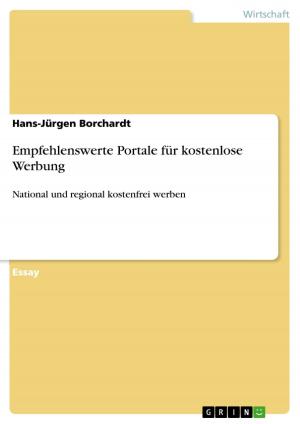Pre-departure management of expatriates - Effective enough to adjust overseas?
An expatriate view
Business & Finance, Human Resources & Personnel Management| Author: | Sabrina Hoffstädte | ISBN: | 9783638736435 |
| Publisher: | GRIN Verlag | Publication: | June 24, 2007 |
| Imprint: | GRIN Verlag | Language: | English |
| Author: | Sabrina Hoffstädte |
| ISBN: | 9783638736435 |
| Publisher: | GRIN Verlag |
| Publication: | June 24, 2007 |
| Imprint: | GRIN Verlag |
| Language: | English |
Bachelor Thesis from the year 2007 in the subject Business economics - Personnel and Organisation, grade: First Class / 70%, University of Cooperative Education Mannheim (Akademie für Betriebswirtschaft und Welthandelssprachen), 94 entries in the bibliography, language: English, abstract: The increasing globalisation of the world results in the internationalisation of companies which are impelled to send their most skilled employees abroad in order to conduct cross-border activities and to support the subsidiaries for a specific period of time. Those employees are called expatriates which are 'gatekeepers' to other cultures. They are the ones who have to cope and work with people from different cultural backgrounds and are often faced with cultural differences or even conflicts. This dissertation shows how important it is to select and train the right candidates for an international assignment in order to make their stay more effective and likewise successful. Besides, other aspects of the adjustment process of the expatriate and the accompanying spouse are highlighted. In order to compare the theory presented in chapter two with the 'real' world of expatriate management, expatriates from three different companies - SAP, Siemens and Bosch - have been questioned. The selection procedures of the companies as well as the effectiveness of the training have been analysed and were further commented by expatriates. Furthermore, adjustment problems and key factors for a successful stay abroad are mentioned, too. Lastly, conclusions from the findings and analyses are presented which show that it is not only important to train international assignees but also to find someone who really wants to go abroad; someone who has the right mindset or to be precise an open-minded attitude towards people with different cultural values. Moreover, the adjustment and mental well-being of the spouse are key factors for a good adjustment and successful stay of the expatriate.
Bachelor Thesis from the year 2007 in the subject Business economics - Personnel and Organisation, grade: First Class / 70%, University of Cooperative Education Mannheim (Akademie für Betriebswirtschaft und Welthandelssprachen), 94 entries in the bibliography, language: English, abstract: The increasing globalisation of the world results in the internationalisation of companies which are impelled to send their most skilled employees abroad in order to conduct cross-border activities and to support the subsidiaries for a specific period of time. Those employees are called expatriates which are 'gatekeepers' to other cultures. They are the ones who have to cope and work with people from different cultural backgrounds and are often faced with cultural differences or even conflicts. This dissertation shows how important it is to select and train the right candidates for an international assignment in order to make their stay more effective and likewise successful. Besides, other aspects of the adjustment process of the expatriate and the accompanying spouse are highlighted. In order to compare the theory presented in chapter two with the 'real' world of expatriate management, expatriates from three different companies - SAP, Siemens and Bosch - have been questioned. The selection procedures of the companies as well as the effectiveness of the training have been analysed and were further commented by expatriates. Furthermore, adjustment problems and key factors for a successful stay abroad are mentioned, too. Lastly, conclusions from the findings and analyses are presented which show that it is not only important to train international assignees but also to find someone who really wants to go abroad; someone who has the right mindset or to be precise an open-minded attitude towards people with different cultural values. Moreover, the adjustment and mental well-being of the spouse are key factors for a good adjustment and successful stay of the expatriate.















